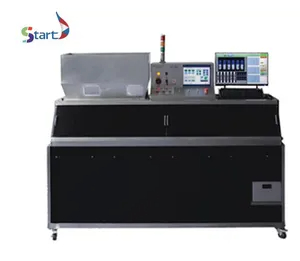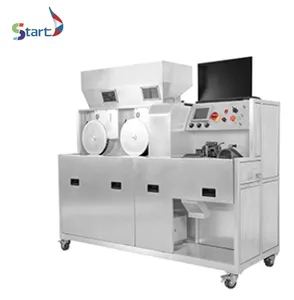The Future of Pharmaceutical Quality Control: Advanced Automatic Inspection Machines for Tablets and Capsules
INDUSTRIAL SUPPLIES
10/4/20245 min read


In the pharmaceutical industry, the importance of quality control cannot be overstated. Ensuring that every tablet, capsule, or pharmaceutical product is safe, accurate, and compliant with regulatory standards is crucial. As the demand for high-quality and efficient production grows, so does the need for advanced machinery that can automate and streamline the inspection process. This blog will delve into the world of automatic inspection machines for tablets and capsules, exploring how these devices enhance the efficiency, accuracy, and reliability of the pharmaceutical production line.
What Are Automatic Inspection Machines for Tablets and Capsules?
Automatic inspection machines for tablets and capsules are state-of-the-art devices designed to inspect and verify the quality of pharmaceutical products during the production process. These machines are equipped with advanced technologies such as CCD cameras, laser sensors, and optical imaging systems, which allow for thorough inspection of each unit. Whether you're dealing with filled capsules, empty capsules, or tablets, these machines ensure that every product meets the highest standards of quality, free from defects, contaminants, or irregularities.
The Role of Technology in Pharmaceutical Inspection
The integration of cutting-edge technology into the pharmaceutical industry has transformed the way products are manufactured and inspected. Advanced automatic inspection machines use technology such as computer vision, artificial intelligence, and high-resolution imaging systems to detect any abnormalities in tablets and capsules. These technologies offer numerous benefits, including speed, precision, and the ability to detect even the most minute defects.
CCD Cameras: Charge-Coupled Device (CCD) cameras are used in many automatic inspection machines to provide detailed imaging of the tablets and capsules. These cameras can identify surface defects, color discrepancies, and other irregularities that may compromise the quality of the product.
Laser Sensors: Laser technology is utilized to measure the size, shape, and surface texture of tablets and capsules. It can also detect variations in weight, ensuring consistency across the production batch.
Optical Imaging: Optical imaging systems are capable of capturing high-resolution images, providing a clearer view of the tablet or capsule surface, allowing operators to spot defects or contaminants that could pose health risks.
Why Quality Control Matters in Tablet and Capsule Production
In the world of pharmaceuticals, the accuracy and integrity of each pill or capsule are paramount. Tablets and capsules are often taken by consumers with specific health conditions, and any deviation in formulation or packaging could lead to serious health consequences. Furthermore, regulatory bodies such as the FDA (Food and Drug Administration) impose stringent guidelines on pharmaceutical manufacturing. Automatic inspection machines help pharmaceutical companies meet these standards, ensuring that each product is correctly dosed and free from contamination.
Key Types of Automatic Inspection Machines
The market for automatic inspection machines is diverse, with various models designed to handle specific inspection needs. Here are some of the key types of inspection machines that play an integral role in the pharmaceutical industry:
Automatic Tablet Inspection Machines: These machines are specifically designed to inspect the quality of tablets. They check for defects such as cracks, chips, or color discrepancies. The most advanced models also check for the uniformity of tablet size, weight, and even coating consistency.
Automatic Capsule Inspection Machines: These machines are used to inspect both filled and empty capsules. They check for physical defects such as holes, dents, and irregularities in the capsule shell, ensuring that only the highest-quality capsules are delivered to the packaging stage.
Filled Capsule Inspection Machines: These machines are specifically designed to inspect filled capsules. They detect problems such as incorrect filling, leaks, or variations in capsule content, which can impact the product's effectiveness.
Empty Capsule Inspection Machines: Before capsules are filled, it’s essential to ensure that the empty capsules are defect-free. Empty capsule inspection machines scan each capsule for imperfections, such as cracks, discoloration, or improper sealing.
The Benefits of Using Automatic Inspection Machines
Incorporating automatic inspection machines into pharmaceutical production lines offers a wide array of benefits. Some of the most notable advantages include:
Increased Efficiency: Automatic inspection machines can process thousands of tablets or capsules per minute, significantly increasing the speed of production without compromising on quality.
Enhanced Precision: These machines offer a level of precision that human inspectors cannot match. By using high-tech imaging and sensor systems, they can detect even the smallest defects, ensuring that every product meets the highest standards.
Consistency and Reliability: Human inspectors can become fatigued and may overlook defects, leading to inconsistent results. Automatic inspection machines, on the other hand, provide consistent performance, ensuring that every tablet or capsule is inspected thoroughly.
Regulatory Compliance: Automatic inspection machines help manufacturers comply with strict regulatory standards by ensuring that their products meet the required quality thresholds. This reduces the risk of recalls or fines from regulatory authorities.
Cost Savings: While the initial investment in automatic inspection machines can be significant, the long-term cost savings are considerable. These machines reduce the need for manual labor and can help eliminate defective products from entering the market, saving manufacturers both time and money.
Understanding the Different Models of Inspection Machines
As the pharmaceutical industry continues to innovate, manufacturers have developed a variety of specialized automatic inspection machines to cater to different production needs. Some of the most advanced models include:
Two-Side Tablet Inspection Machine Model Yj-250: This machine is designed for inspecting both sides of tablets, ensuring that both surfaces are free from defects. It is highly efficient and capable of processing large volumes of tablets.
Auto Printed Capsules Inspection Machine Model Pl-2: This model is specifically used for inspecting printed capsules, ensuring that the printing on each capsule is clear and consistent, without any smudging or fading.
Inspection Machine for Fully CCD Auto Inspection of Tablets: This machine is equipped with fully automated CCD inspection capabilities, making it ideal for high-speed production lines that require precise quality control.
Filled Capsules Automatic Inspection Machine Model "Pi4f": This advanced inspection machine is designed to detect any defects in filled capsules, such as incorrect filling levels or leaks, ensuring that every capsule is correctly dosed and sealed.
How Automatic Inspection Machines Are Enhancing Pharmaceutical Manufacturing
Automatic inspection machines are revolutionizing pharmaceutical manufacturing by offering a high level of accuracy, efficiency, and reliability. As the demand for high-quality pharmaceutical products increases, the role of these machines becomes even more critical. The integration of automation and artificial intelligence into the inspection process allows manufacturers to keep up with growing demand while maintaining the highest standards of quality control.
These machines are not only improving the overall quality of pharmaceutical products but also reducing the risk of contamination and defects, which ultimately benefits consumers and enhances trust in the pharmaceutical industry.
Challenges and Solutions in Automatic Inspection Machines
While automatic inspection machines offer many advantages, they also come with their own set of challenges. Some of the most common challenges faced by manufacturers include:
High Initial Investment: The cost of acquiring automatic inspection machines can be substantial, especially for smaller manufacturers. However, the long-term savings and improved efficiency typically offset this initial cost.
Maintenance and Calibration: Regular maintenance and calibration are essential to keep automatic inspection machines running at peak performance. Without proper maintenance, the machines may experience malfunctions or inaccuracies.
Material Compatibility: Not all tablets or capsules are the same, and different materials may require different types of inspection. Manufacturers must ensure that their inspection machines are compatible with the materials they use.
The Future of Automatic Inspection Machines in the Pharmaceutical Industry
The future of automatic inspection machines looks promising, with ongoing advancements in technology. Artificial intelligence, machine learning, and advanced imaging techniques are set to enhance the capabilities of these machines even further. As the pharmaceutical industry continues to evolve, automatic inspection machines will play a key role in maintaining product quality, reducing production time, and ensuring consumer safety.
Conclusion
The integration of advanced automatic inspection machines in pharmaceutical production is not just a trend—it's an essential investment in quality, efficiency, and regulatory compliance. From ensuring the accuracy of tablets and capsules to enhancing the overall production process, these machines are indispensable in the fast-paced and highly regulated pharmaceutical industry. As technology continues to advance, the role of automatic inspection machines will only grow, making them an indispensable part of pharmaceutical manufacturing for years to come.


